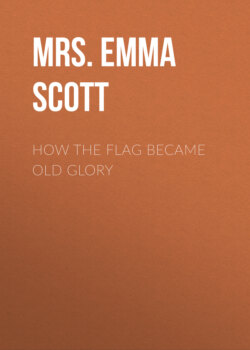Читать книгу How the Flag Became Old Glory - Mrs. Emma Look Scott - Страница 6
На сайте Литреса книга снята с продажи.
IN THE LIGHT OF THE OLD NORTH CHURCH
ОглавлениеTable of Contents
“History points no struggle for liberty which has in it more of the moral sublime than that of the American Revolution.”
THEY were a godly people, these revolutionary fathers of ours. They prayed as they thought; and they fought as they believed and prayed. They sought no quarrel with the mother country; they asked only independent action, considering themselves full grown in point of knowledge of their needs and desires, although but infants in age as compared with other subjects of Great Britain.
When, therefore, Old England announced, “You shall pay taxes!” the colonists demurred.
“We are not represented in your Parliament; we have no voice in your councils!”
“But you must pay taxes,” she commanded.
They replied, “We will not.”
“I will compel you,” retorted she.
The Old North Church.
“If you can,” was the answer.
A British fleet then sailed into Boston harbor, and British soldiers swarmed over Boston town. This action enraged the citizens. It angered the “Sons of Liberty,” whose name is self-explanatory and whose slogan was “Liberty or Death,” and inspired them to more vigorous efforts toward freedom from Britain’s power. The “Minute Men” were organized and stood ready to the summons, ready at a minute’s notice to leave forest, field, or fire side, to take up arms in defense of their liberties and their rights.
The spirit of dissension ran rife; and petty altercations between the British soldiers and the citizens were of daily occurrence. A trivial happening brought about the Boston Massacre. A “Son of Liberty” and a British soldier disputed the right of way of a street passage.
“Stand aside,” said the one.
“Give way,” said the other.
Neither would yield. Blows followed. Rocks flew. The soldiers marshaled and fired into the crowd. Several citizens were killed. The town was ablaze with excitement. And the governor had finally to withdraw the troops from Boston.
When antagonism had abated in degree, King George devised new measures of taxation and stirred ill feeling again. Boston brewed British tea in the ocean. England disliked the taste of it. The people were declared Rebels; and the charter of Massachusetts was annulled by Parliament. Ten thousand British soldiers then came over. Boston Neck was seized and fortified. The colonists were to be forced into obedience.
Then from Lexington and Concord the signals of revolt were sounded—
“They were building well for a race unborn,
As the British plowed through the waving corn,
For the birth-pang of Freedom rang that morn.”
The Battle of Bunker Hill that followed was but the natural sequence. Defeated though the patriots were in this their first real battle, it was a defeat that spelled for them ultimate victory. This they recognized dimly, but certainly, as they knew that they had gone into battle with a prayer on their lips for themselves, for their homes, and their country. Their hearts were fired anew for freedom. Their arms would be strengthened to their desires. As the lights from the belfry of Old North Church revealed to Paul Revere the route the British were to take against them in the memorable beginnings at Lexington and Concord, so the light from the Great Book above its chancel rail would direct them the way they should go.
The Battle of Lexington.
